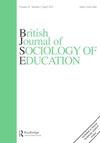Research assessment, emotional practices, and the social hierarchy: what can you afford to feel?
IF 2.1
3区 教育学
Q1 EDUCATION & EDUCATIONAL RESEARCH
引用次数: 0
Abstract
Abstract This paper investigates how the emotional responses towards research assessment reflect both social position and strategy in the struggle for scientific authority. This is examined through interviews with humanities researchers conducted as a part of a study on the implications for research practice of the Danish Bibliometric Research Indicator (BFI). Drawing on Bourdieu’s theory of practice and Scheer and Matthäus’ conceptualisation of the affective habitus and emotional practices, our research suggests that emotions can be conceptualized as strategic practices closely tied to the hierarchical position of the researchers. Established researchers deployed emotional practices as a form of resistance against compliance-based research assessment to retain their scientific authority and autonomy, while early-career researchers generally wanted to resist but their precarious positions did not afford them the possibility to do so. The study thus highlights the potential of studying emotions in relation to resistance and reproduction of dominance in higher education.研究评估、情感实践和社会等级:你能承受的感受是什么?
摘要本文探讨了研究评价的情绪反应如何反映了科学权威斗争中的社会地位和策略。作为丹麦文献计量研究指标(BFI)研究实践的影响研究的一部分,对人文学科研究人员进行了访谈,对这一点进行了检验。借鉴布迪厄的实践理论和谢尔以及Matthäus对情感习惯和情感实践的概念化,我们的研究表明,情感可以被概念化为与研究人员的等级地位密切相关的战略实践。成熟的研究人员将情感实践作为一种抵制基于服从的研究评估的形式,以保持他们的科学权威和自主权,而早期职业研究人员通常想要抵制,但他们不稳定的地位不允许他们这样做。因此,这项研究强调了在高等教育中研究与抵抗和统治再现有关的情绪的潜力。
本文章由计算机程序翻译,如有差异,请以英文原文为准。
求助全文
约1分钟内获得全文
求助全文
来源期刊
CiteScore
3.70
自引率
9.50%
发文量
74
期刊介绍:
British Journal of Sociology of Education is one of the most renowned international scholarly journals in the field. The journal publishes high quality original, theoretically informed analyses of the relationship between education and society, and has an outstanding record of addressing major global debates about the social significance and impact of educational policy, provision, processes and practice in many countries around the world. The journal engages with a diverse range of contemporary and emergent social theories along with a wide range of methodological approaches. Articles investigate the discursive politics of education, social stratification and mobility, the social dimensions of all aspects of pedagogy and the curriculum, and the experiences of all those involved, from the most privileged to the most disadvantaged. The vitality of the journal is sustained by its commitment to offer independent, critical evaluations of the ways in which education interfaces with local, national, regional and global developments, contexts and agendas in all phases of formal and informal education. Contributions are expected to take into account the wide international readership of British Journal of Sociology of Education, and exhibit knowledge of previously published articles in the field. Submissions should be well located within sociological theory, and should not only be rigorous and reflexive methodologically, but also offer original insights to educational problems and or perspectives.

 求助内容:
求助内容: 应助结果提醒方式:
应助结果提醒方式:


